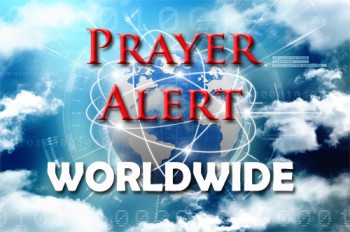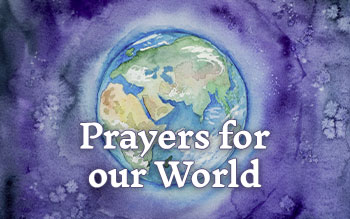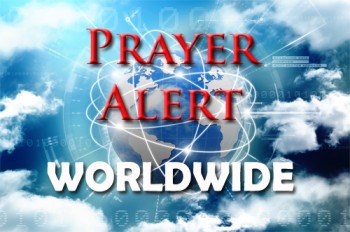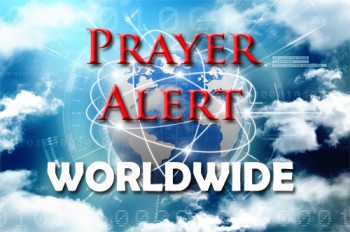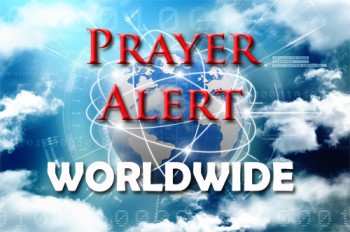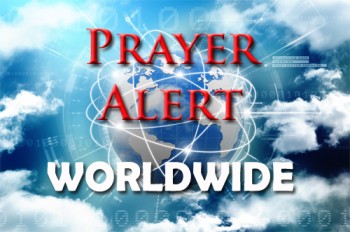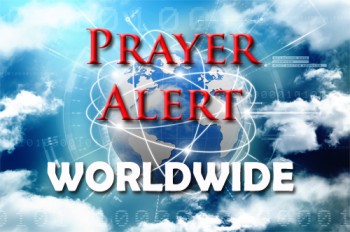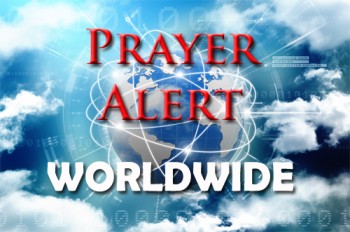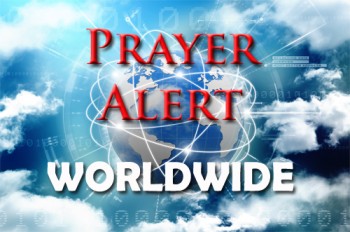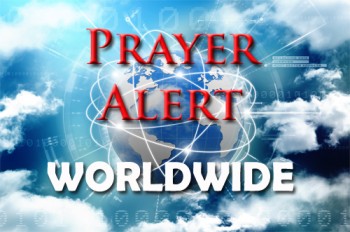Displaying items by tag: Africa
Algeria: Christian persecution escalates this year
Windows International Network reported, ‘Christian churches are locked down, Believers are threatened and beaten, homes are invaded, Bibles are confiscated and destroyed, pastors are imprisoned’ and ‘the Muslim persecution of Christian Believers has drastically increased since 2017.’ Algeria is a former French colony, and the French government is so disturbed by this new intolerance that the French parliament has officially opened an inquiry into persecution of Christians in Algeria which has risen to number 22 on the 2019 Open Doors World Watch List of the worst persecutors of Christians in the world. Pray for Christian believers as they face increased persecution and the pastors who are imprisoned to be sustained by the Holy Spirit. Pray also for Muslim-background Christians to be strengthened in their witness to family and friends.
Burkina Faso: 6 killed for following Jesus
THEY REFUSED TO DENOUNCE JESUS — PASTOR, 5 OTHERS SHOT AFTER CHURCH SERVICE IN BURKINA FASO
Last Sunday seemed like any Sunday for 80-year-old Pastor Pierre OuIt, who has spent 40 years serving his church and Sirgadji village community in the northeastern Soum province of Burkina Faso. On April 28, he gathered for worship with his congregation in the West African country. And like every Sunday, he preached the Word of God with the wisdom that seasoned years of life and ministry bring.
But shortly after the service, an ordinary Sunday suddenly turned deadly and a church building where worshippers had just gathered became a crime scene.
KILLED FOR FOLLOWING JESUS
At about 1 pm, while Pastor Pierre was still talking with several congregants in the churchyard, a dozen men on motorbikes stormed the area.
A local leader who wished to remain anonymous told World Watch Monitor: “The assailants asked the Christians to convert to Islam, but the pastor and the others refused.”
Reportedly, the attackers gathered Pastor Pierre and the five other congregants under a tree and then confiscated their Bibles and cell phones.
“Then they called them, one after the other, behind the church building where they shot them dead,” the leader said.
In addition to Pastor Pierre, the attackers killed his son, Wend-Kuni, and his brother-in-law (a church deacon), Zoéyandé Sawadogo, as well as believers Sayouba and Arouna Sawadogo, and a primary school teacher, Elie Boena. Another was seriously injured and taken to a nearby hospital.
The men then set the church building and two motorbikes on fire. Before they left, they stole sheep and a bag of rice from Pastor Pierre’s home.
He and his five congregants were buried the same day in a ceremony that drew people from both Christian and Muslim communities. The pastor leaves behind his wife and six other children.
Other locals reported that the next day, the same attackers (some of them known to village residents as “young men who’ve been radicalized”) came back into the village “searching for Christians.”
The sources say the armed groups can move with impunity because of the lack of law enforcement in the area in the West African country.
“I WOULD RATHER DIE THAN LEAVE”
Previously, Pastor Pierre told relatives about his concerns over the deterioration of security in the region, though there had been no incidents in his village.
The community leader said that when he and others advised the pastor to leave the area, he refused, saying he “would rather die for his faith than leave the community he has been serving for 40 years.”
In the last few months, more than 100 Christians have fled the area, moving farther south, more than 46 miles away. In February, armed men believed to be Islamist militants killed a church leader in the southeast region of Nohao, as he was returning from Togo.
Last Sunday’s violence in Burkina Faso that took the life of Pastor Pierre and his five congregants appears to have been the first attack, specifically on a church building, in which believers in Burkina Faso have been killed by Islamist extremists.
Pray: for the families of the martyrs, that they will have the grace to forgive the attackers.
Pray: for protection of Christians facing persecution daily, around the world.
Pray: for the attackers to be brought to justice.
May 7, 2019 by Lindy Lowry
Asia and Africa: change and conflict
In Algeria and Sudan, peaceful protesters are continuing to demand genuine change, but the military - the most powerful institution in both countries - resist the calls. Both countries know that ousting an authoritarian leader is no guarantee of reform. In each case, Christian communities have added their voices to the calls for greater democracy and transparency. In the Holy Land, recent violence saw Islamic militants from Gaza launch 600+ rockets into Israel, and Israel responding with a heavy bombardment. Both sides eventually agreed a ceasefire, which is currently holding, but the UN envoy to the Middle East warned on 13 May that the risk of another war ‘remains imminent’. Half the Christian population has returned to Iraq following the collapse of IS, but they are returning to broken towns and Iran-backed militias in the Nineveh area. The search for peace, good governance, fairness, justice and dignity continues.
Libya: persecuted for faith and gender
There are about 37,900 Christians in Libya: most are migrant workers from abroad. Libyan Christians must keep their faith secret, so it is hard to know how many there are in this tribal, Islamic society. The government claims that ‘all Libyans are Muslims’. The anarchy and civil war mean that the rule of law barely exists, and Islamist extremists attack Christians freely. Leaving Islam is a betrayal, and being a woman makes you second class. Christian women in Libya are doubly vulnerable to persecution, targeted for their gender and their faith. Their suffering is invisible. They are ignored by the world around them. Open Doors want every woman to reach her God-given potential, and have launched a ‘Change’ campaign. For more info click the ‘More’ button.
Burkina Faso: another church attack
For the second time since Easter, a church in Burkina Faso has suffered a terrorist attack during a Sunday services. This target was a Catholic church in Dablo, where the priest and five worshippers were killed. This prompted a series of déjà-vu headlines among global media outlets as the death toll matches last month’s attack on an Assemblies of God church. The assailants again arrived on motorcycles and interrupted morning Mass, shooting the congregation as they tried to flee. They ordered the women and children to clear the scene before executing six men, including the priest, and setting fire to the church The martyred priest, 34-year-old Simeon Yampa, was described as ‘a humble person, obedient and full of love’. The nation has suffered hundreds of attacks by jihadists in recent years, but these two were the first on houses of Christian worship.
Nigeria: 894 children released
Since 2012, non-state armed groups in north-east Nigeria have recruited and used children as combatants and non-combatants, raped and forced girls to marry, and committed other grave violations against children. Some of the girls become pregnant in captivity and give birth without any medical care or attention. Recently 894 of these children, including 106 girls, were released from the ranks of the Civilian Joint Task Force (CJTF) in Maiduguri, north-east Nigeria, as part of its commitment to end and prevent the recruitment and use of children. The CJTF is a local militia helping Nigerian security forces fight against insurgency by protecting communities from attack. The children will now be helped to return to normal civilian life and learn vocational skills. Pray for the children who have borne the brunt of this conflict, witnessing killing and violence, resulting in serious implications for their physical and emotional well-being.
South Africa: Christians march for true freedom
Worship songs and heartfelt prayers filled the streets of neighbourhoods across South Africa on Freedom Day, Saturday 4 May, as believers celebrated their freedom in Christ and prayed for change in the country. Over 80 Jesus Marches took place in small towns and in big cities. Many participants were armed with black bags to clean the streets while praying. At the 10am start of the marches a prayer for the nation that was streamed to all the march venues via mobile phones. The central theme was John 8:36 - ‘Who the Son sets free is free indeed’. Many referred to the event as celebrating ‘True Freedom Day’, as only Christ can truly set us free and no government or worldly system can provide all the answers to society’s problems. Christians were encouraged to wear white on election day - Wednesday 8 May. See also the next article, on the elections.
South Africa: pivotal elections
Twenty-five years ago, under Nelson Mandela, the African National Congress (ANC) party ended apartheid, but since then it has governed poorly. Four in ten South Africans still live in poverty. Half of young people are unemployed, in an unequal society caused by corruption at all government levels. Seven out of ten South Africans don't trust politicians and many under-30s did not bother to vote in the 8 May elections. At the time of writing, ballot results are trickling in with the results expected on 11 May. The weakness of its challengers means that the ANC is expected to win again, but national projections show a drop in support of 8%. Recently the ANC replaced President Zuma with his deputy, Cyril Ramaphosa, who is attempting to recover stolen state funds. So far he has been unable to remove the deeply entrenched crony networks of corrupt local officials and power brokers who deliver many votes for ANC. See also the previous article, and
Sudan: ‘deep state’ of Islamists remains
Omar al-Bashir is no longer Sudan’s president, but those who served him want to hold on to power through a military council. Meanwhile, protesters are still staging a sit-in outside Khartoum’s military headquarters and demanding that power be handed over to civilians. Islamist regime insiders who were close to al-Bashir remain in the shadows, and, unfortunately for the Christian minority of 3%, they are determined to maintain their grip on power. These Islamists are what is being described in media reports as a ‘deep state’ of shadowy authority figures that could eventually seize power in a counter-coup. Islamist influence is strong in the upper echelons of the armed forces and political parties are weakened by decades of authoritarian rule. It will be difficult for independent individuals with experience and strength to deal with these dangers.
Mozambique left in ruins by second cyclone
For the first time in recorded history, Mozambique has been hit by two cyclones in one season. Category 4 Kenneth arrived six weeks after Idai killed 600+ people with flooding. Kenneth killed at least 41 people and destroyed thousands of homes across northern Mozambique. Ibo Island was particularly hard hit, receiving food aid only six days after Kenneth destroyed thousands of homes. The human cost of the disaster is only now being revealed. The UN described reaching Ibo as ‘incredibly difficult’. Initial estimates are that 90% of structures were damaged. ‘If somebody hasn’t lost everything, he’s a lucky guy because no-one has escaped,’ said a motorcycle taxi driver. Almost everybody lost their belongings. The World Food Programme said that Kenneth dumped twice as much rain as Idai, nine inches, or about a quarter of the average annual rainfall for the region - again raising concerns about climate change. See
